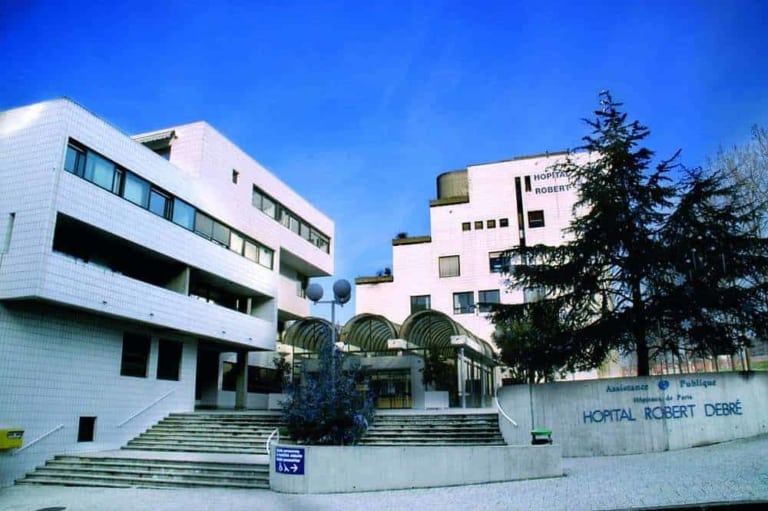
Département de Génétique
APHP Nord-Université de Paris – Hôpital Robert Debré
48 boulevard Sérurier
75019 PARIS
FRANCE
Lead
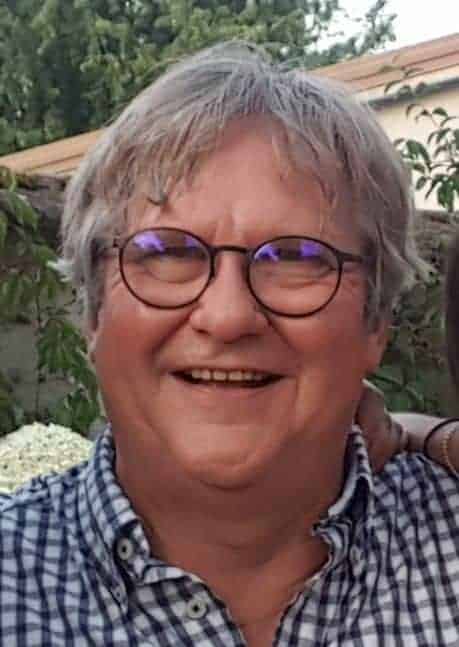
Pr Alain Verloes (ERN ITHACA EU coordinator)
Telephone: +33 (0)1 40 03 53 06
Scope
The area of expertise of the Paris Centre of the ITHACA European Reference Network (ERN) covers all syndromes exhibiting developmental anomalies and/or intellectual disability (ID). About 1/40 newborn has a congenital malformation (261/10000 fetuses and newborn following EuroCAt reports), and 1/40 has ID. Therefore, 3 to 5 % of all human births show or will develop a developmental anomaly, among which at least 25-50% are of genetic or genomic origin. This huge population represents in reality the juxtaposition of a very large number of individually rare disorders showing an extreme diversity of causes and phenotypes. The jurisdiction and scope of expertise of Paris ITHACA Centre includes:
- over 5500 dysmorphic and multiple congenital anomaly (MCA) syndromes (listed in the London Dysmorphology Database), among which over 3000 monogenic diseases, all chromosome abnormalities (most of them only detectable through array technologies), multifactorial, sporadic dysmorphological anomalies and embryofetopathies of environmental origin
- >1500 monogenic and hundreds chromosomal forms of ID with or without associated autism spectrum disorder (ASD)
Service to patients
The regional population covered by the Paris Centre counts more than 12 million inhabitants. Moreover, about 10% of the patients seen in the Centre are referred from other French regions or from foreign countries. The Centre contributes to the care to patients by offering clinical diagnosis, genetic testing, familial screening, genetic counseling, neuropsychological and neuropsychiatric evaluation, prenatal diagnosis, follow up and coordination of the day care and reeducation of patients, and therapeutic assays in the field of developmental anomalies, in connexion with two National Heathcare networks (AnDDI-Rares and DefiScience).
Organization of the ITHACA ERN – Paris Centre
The Assistance Publique-Hôpitaux de Paris (APHP)
APHP is a public health establishment and a university hospital trust (CHU) operating in Paris and its surroundings ( Ile-de-France region – 12 million inhabitants). It is the largest HCP in Europe : more than 20.000 beds, over 5 million consultations and 1,5 million emergencies/year). APHP is also the largest employer in Ile-de-France: 100,000 people – including 16.000 doctors, researchers, paramedics, socio-educational and administrative staff and workers work there.
APHP is organized around six hospital local trusts (GH), including Bicêtre (BCT) University Hospitals, each associated to a medical school to offer integrative care to its population, each made up of several hospitals, four of which contribute to ITHACA:

Robert Debré (RDB)
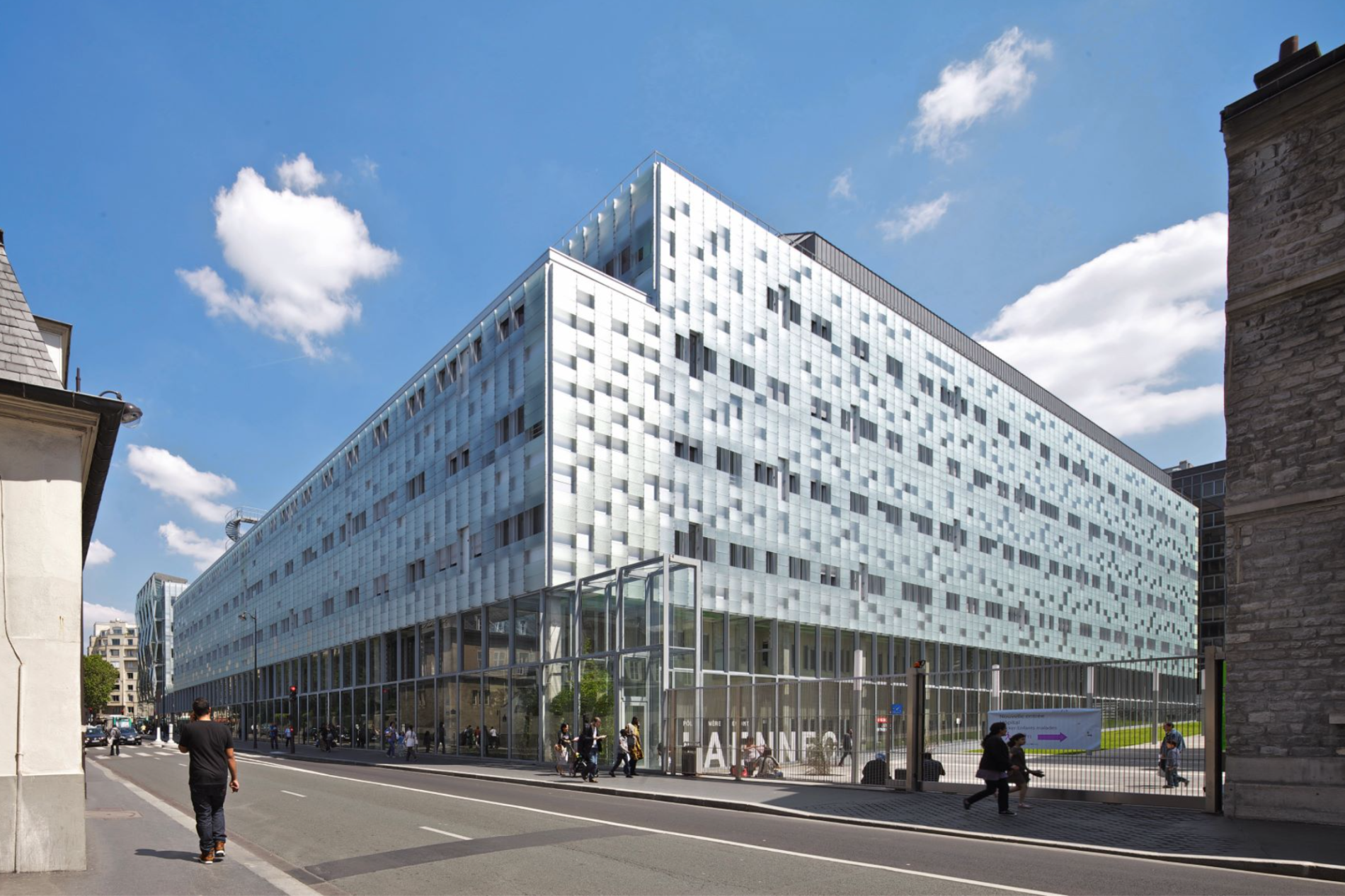
Necker-Enfants Malades (NCK)
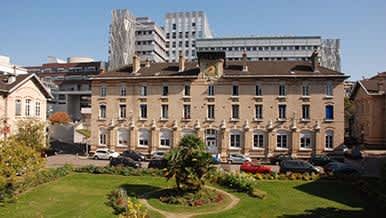
Armand Trousseau (TRS)
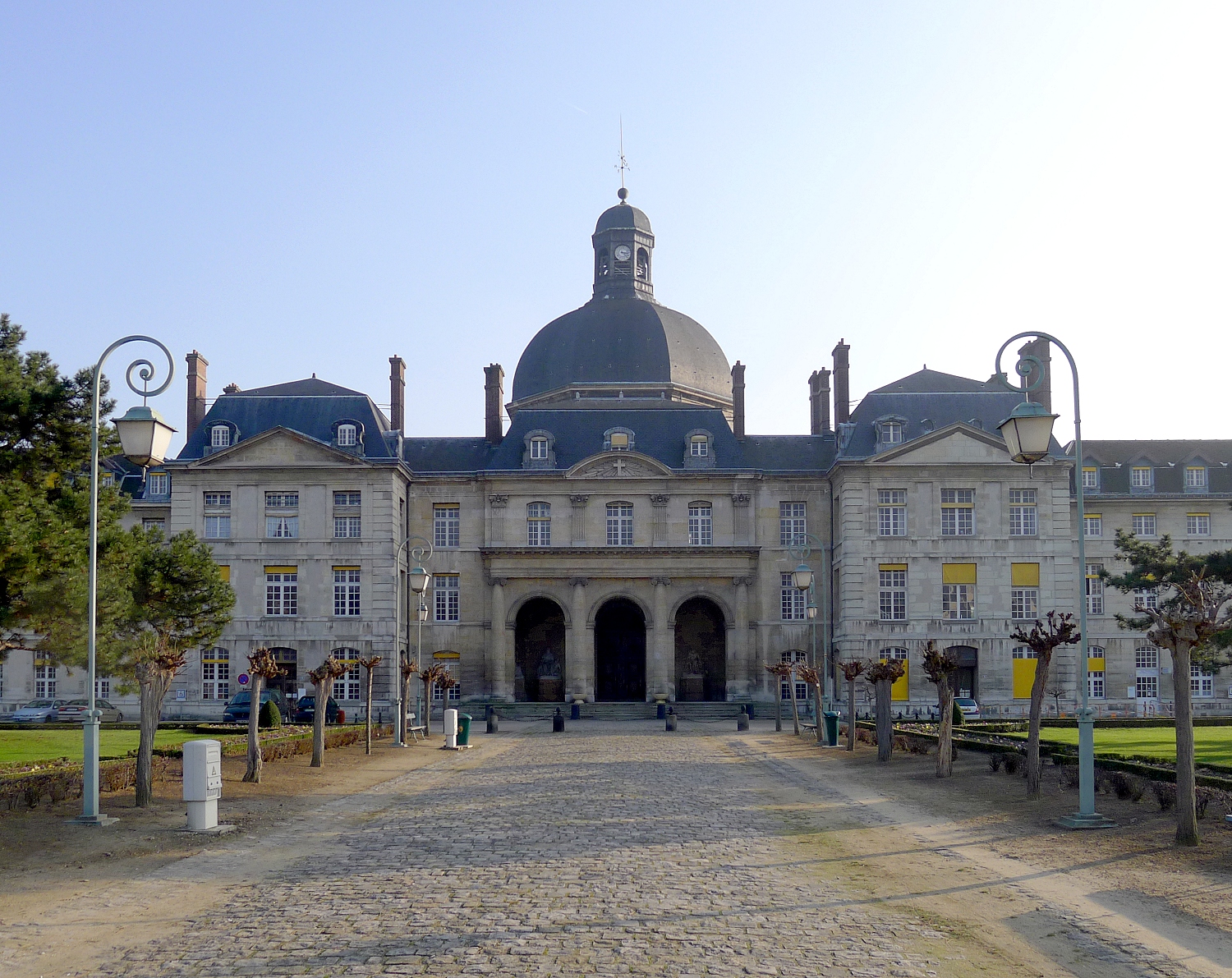
Pitié-Salpêtrière (PSL)
Altogether, these 4 hospitals count over 1100 pediatric beds, over 2100 beds for adults (mostly in PSL), and 5 maternity wards with over 12000 births/year.
The general expertise of APHP in the field of rare diseases has been recognized at a national level, as departments in APHP harbour more than 60 national reference centers for rare diseases (RCRD).
Structure of the ITHACA ERN – Paris APHP Centre
The APHP consortium is led by Alain Verloes (ERN ITHACA EU coordinator)
Department of Genetics, AP-HP. Nord Université de Paris – Robert Debré University Hospital
48 boulevard Sérurier – 75019 PARIS
In the ERN-ITHACA project is organized around five national Reference or Excellence Centres connected to three Universities, covering four scientific and medical axes:
- Developmental anomalies
RCRD for developmental anomalies and intellectual disability (AnDDI-Rares)
- Pr Alain VERLOES, Department of Genetics, AP-HP.Nord – University of Paris – Robert Debré Hospital (RDB) – coordinator of the RCRD
- Pr Jeanne AMIEL, Department of Clinical Genetics, AP-HP.Centre – Université de Paris ; Necker Hospital (NCK)
- Daphne LEHALLE, Department of Genetics, AP-HP.Sorbonne University – Trousseau & Hospitals (TRS)
- Intellectual disability
RCRD for rare causes of intellectual disability (DéfiScience)
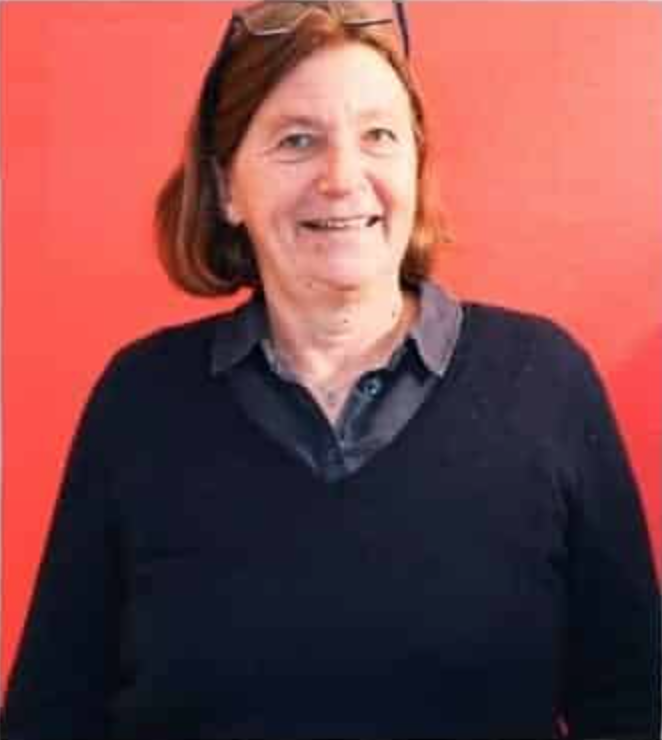
- Dr Delphine HERON, department of Genetics, AP-HP.Sorbonne University – Pitié-Salpêtrière Hospital (PSL) – Coordinator of the RCRD
- Dr Nadia BAHI BUISSON, Department of Child Neurology, AP-HP.Centre – University of Paris ; Necker Hospital (NCK)
- Dr Marlène RIO, Department of Genetics, AP-HP.Centre – University of Paris ; Necker Hospital (NCK)
- Dr Stéphanie VALENCE, Department of Child Neurology, AP-HP.Sorbonne University- Trousseau Hospital (TRS)
- Dr David GERMANAUD, Department of Genetics, AP-HP.Nord – University – Robert Debré Hospital (RDB)
- Cerebellar anomalies
RCRD : cerebellar anomalies (2M2C)
- Dr Lydie BURGLEN, Department of Child Neurology, AP-HP.Sorbonne University – Armand Trousseau Hospital (TRS), Coordinator of the RCRD
- Autism Spectrum Disorder (ASD)
Center of Excellence for Autism and Neurodevelopmental Disorders (InovAND)
- Pr Richard DELORME, Department of Child and Adolescent Psychiatry, AP-HP.Nord – University – Robert Debré Hospital (RDB) , Coordinator of the CE
RCRD: rare disorders with psychiatric expression and early onset schizophrenia
- Pr David COHEN, Department of Child and Adolescent Psychiatry, AP-HP.Sorbonne University – Pitié-Salpêtrière Hospital (PSL) – coordinator of the RCRD
The RCRD for developmental anomalies of APHP Sorbonne Université is coordinated by Dr. Sandra Whalen, who is also the ERN-ITHACA representative for this center.
The RCRD is composed of the clinical genetic units of Hôpital Armand Trousseau and Groupe Hospitalier Pitié-Salpêtrière, with Dr. Delphine Héron at the head of these two units.
The RCRD for developmental anomalies is linked to the rare diseases national french network AnDDI-Rares (Anomalies du Développement avec ou sans Déficience Intellectuelle de Causes Rares). The center is dedicated to all patients with developmental anomalies and their families and is composed by a pluridisciplinary team of geneticists, pediatric neurologists, adult neurologist, genetic counsellors, psychologists, neuropsychologist and ARC (Attaché de Recherche Clinique).
The major asset of the center is to provide care to all patients with developmental anomalies with or without intellectual disability, from the fetal cycle to adulthood, whether the diagnosis is known or not. The mission is to establish a diagnosis and provide genetic counselling, a follow up, and multidisciplinary care. Prenatal care is a major activity of the center, they are the referring geneticists of the pluridisciplinary center for prenatal diagnosis of APHP – Sorbonne Université, and see couples whose fetuses are diagnosed with (or are at risk of having) developmental anomalies. The children and adults are referred to us mainly by hospital specialists, but also by private physicians (general practitioners, specialists), primary care centers, specialised schools or homes for persons with disabilities, etc. For the pluridisciplinary care of our patients, we collaborate with specialists of the two hospitals of our center, Hôpital Armand Trousseau for children, and Groupe Hospitalier Pitié-Salpêtrière for adults (cardiology, neurology, endocrinology, radiology, orthopedic, ophthalmology, ENT, pneumology, gastroenterology, nephrology, etc). Thus, we can provide appropriate child to adult transition, which is particularly important for rare diseases.
The number of annual medical consultations of our center is around 1400.
The RCDR Intellectual Disability is dedicated to all patients with intellectual disabilities, regardless of their severity (from mild ID to polyhandicap) and associated signs.
It also assists families with one or more members presenting an ID, for genetic counselling, genetic diagnosis of asymptomatic persons at risk and the organisation of prenatal diagnosis if necessary.
The Pitié Salpêtrière Hospital site (Dr Delphine Héron) works in close collaboration with the Armand Trousseau Hospital site (coordinated by Pr Thierry Billette de Villemeur), to provide care for patients presenting an ID at all age groups, from the foetus to the ageing adult.
The Pitié-Salpêtrière site is located in a hospital receiving mainly adults, and is located in the Medical Genetics department. Patients (children and adults) consult for etiological diagnostic research and/or support. The team also ensures the transition to adulthood of children followed in the Paris paediatric sites.
The active patient flow at the Pitié Salpêtrière Hospital site is about 1500 patients.
Armand Trousseau’s site is located in a children’s hospital with a maternity unit and a Fetal Medicine Unit. The RCRD is located in the Neuropaediatrics and Clinical Genetics departments. It welcomes children of all ages consulting for psychomotor deficiency and/or ID and specifically provides full inpatient care for polyhandicapped children with total dependency for all acts of everyday life and with medical instability that requires hospitalisation in a specialised environment (dedicated unit of the department at La Roche Guyon).
The active patient flow at the Armand Trousseau Hospital website is 777 patients.
On both sites, the geneticists of the RCRD ID are contact points of the “Centre Pluridisciplinaire de Diagnostic Prénatal des Hôpitaux APHP, Sorbonne Université”, for couples whose foetuses are at risk of intellectual deficiency, in particular foetuses with cerebral malformations or polymalformative syndromes.
At both sites, they also provide genetic counselling for relatives, and organise prenatal diagnosis for genetic neurodevelopmental diseases.
On both sites:
– The medical and paramedical teams are multidisciplinary, including geneticists, neurologists, neuropaediatricians, genetic counsellors, neuropsychologists and psychologists, psychomotricians, occupational therapists, specialised educators, obstetricians, midwives…. as well as clinical research attachés for research.
– The RCRD relies on a network of specialists (child psychiatrists, psychiatrists, doctors of physical medicine and rehabilitation, cardiologists, endocrinologists, radiologists, orthopaedists, ophthalmologists, otorhinolaryngologists…) for adults on site at the Pitié Salpêtrière and for children at the Armand Trousseau Hospital.
Both sites have privileged access to several technical platforms at the university hospital, allowing in particular access to new genetic techniques:
– Constitutional genetics (cytogenetics) and molecular genetics, providing access to high-speed sequencing techniques.
– Fetopathology, carrying out all morphological examinations of embryos and foetuses with a cerebral malformation and/or at risk of DI and malformative syndromes.
– Cerebral screening.
Research
The coordinating site has developed research around 5 main axes in the field of neurodevelopmental genetics in connection with several Research Units (INSERM and CNRS) or International Consortium (including IRC5 (International Research Consortium for the Corpus Callosum and Cerebral Connectivity), and the European Epilepsy Genetics Research Network EuroEPINOMICS) .
1.Identification of new genes responsible for isolated or associated intellectual deficiencies including epileptic encephalopathies and intellectual deficiencies with autism spectrum disorders.
2.Identification of new genes or genetic mechanisms responsible for corpus callosum anomalies.
3.Phenotyping and natural history of new syndromes with intellectual disabilities.
4.Therapeutic trials and validation of new objective and quantitative evaluation criteria that can be used as judgement criteria in trials (Fragile X, Angelman syndrome and Rett syndrome).
5.Ethical and medico-economic issues related to new high throughput sequencing techniques.
General organization of the ITHACA ERN – Paris APHP Centre
In the five constitutive hospitals, Paris setting of ITHACA offers full coverage of general and specialized cares for children, adults and pregnant women:
- 4 departments of medical genetics offering genetic consultation for children and adults, and pregnant women (RDB, NCK TRS, PSL, BCT).
- 4 departments of child neurology and metabolic disorders (RDB, TRS, NCK, BCT)
- 3 department of child psychiatry offering multidisciplinary diagnosis, evaluation and care (including inpatient units) for ID and ASD children (RDB, NCK, PSL).
- Care to children: 4 hospitals (RDB, NCK, TRS, BCT) offer all facilities in general pediatrics and pediatric medical (cardiology, nephrology, endocrinology, neonatology…) and surgical specialties (visceral, cardiac, neurosurgery, orthopedics, ENT, ophthalmology…).
- Care to adults: PSL is a large adult hospital with all medical subspecialities, and a strong involvement in adult neurology and ID in adults
- Prenatal diagnosis (RDB, NCK, TRS, PSL, BCT) and fetal pathology (RDB, NCK)
- Full technical support, including classic medical laboratories, medical imaging, biological investigations, electrophysiology, genetic and genomic investigations including arrays and NGS, and fetal pathology.
Strong association with research institutes (IMAGINE in NCK, ICM in PSL, PROTECT in RDB) and several INSERM or CNRS units targeting neuroscience and/or development, present in the 5 hospitals
Supported by a dense network of Patient Organisations.
